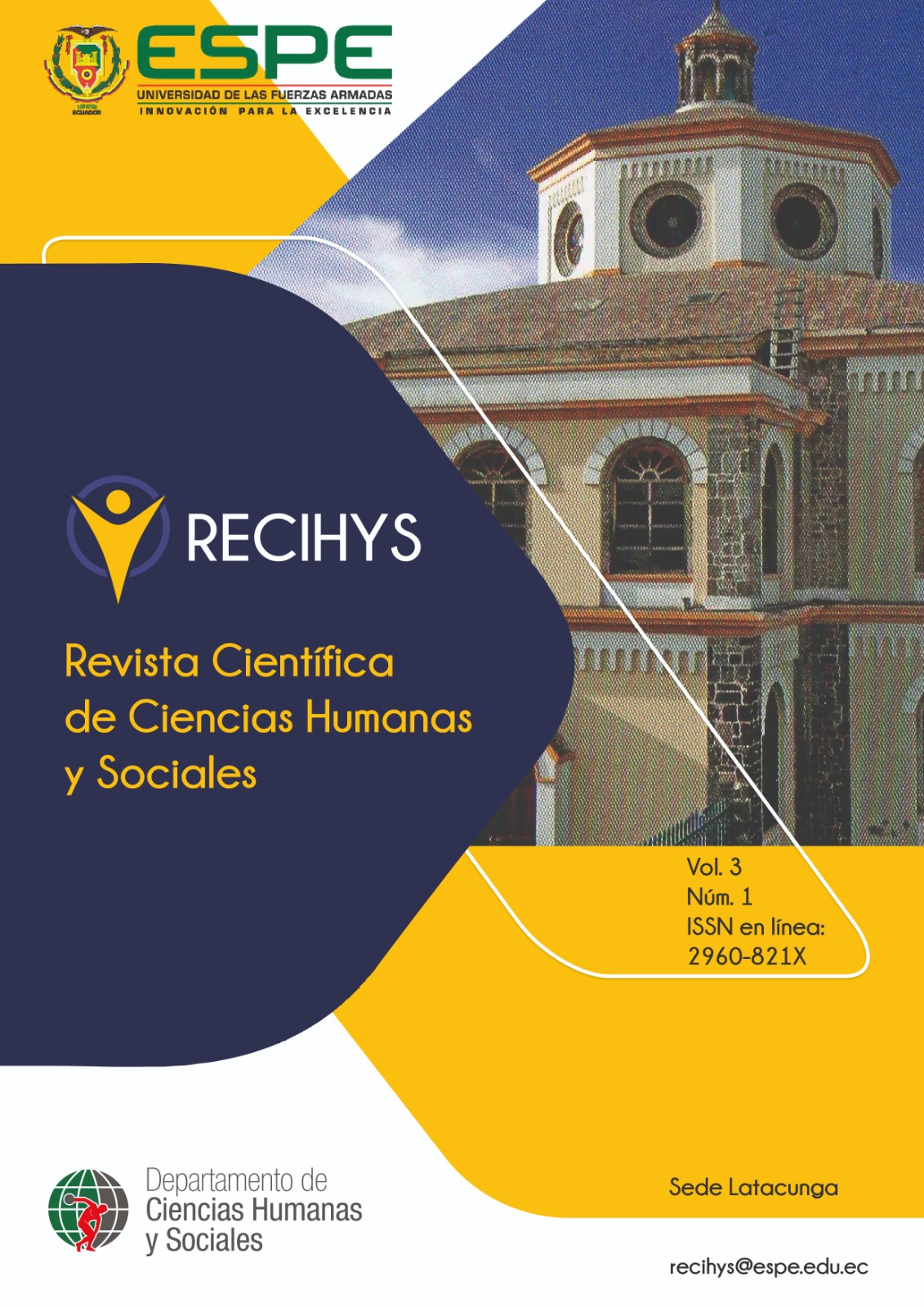Rescue of traditional games as part of Tourist Recreation
Main Article Content
Abstract
This study addresses the rescue of traditional games as a strategy to enrich tourist recreation and preserve cultural heritage. In a context where technology and urbanization threaten to extinguish these practices, the importance of integrating indigenous games into tourism experiences to foster cultural identity and interaction between generations is highlighted. The objective is to analyze the contribution of traditional games to the development and promotion of tourism, highlighting their value in community participation and the preservation of traditions. The research is based on a mixed approach that combines documentary and field methods, applying surveys to students of the Tourism career at Universidad de las Fuerzas Armadas ESPE, Sede Latacunga. The study reflects that 92.3% of those surveyed recognize traditional games as an essential component of cultural identity, and 100% consider that these activities strengthen intergenerational ties. However, the need to promote the use of sustainable materials in these practices is evident. Incorporating traditional games into the tourism offer not only strengthens the sense of cultural belonging, but also generates meaningful experiences for tourists and local communities.
Downloads
Article Details
Authors who publish in this journal agree to the following terms: Authors retain the copyright and guarantee the journal the right to be the first publication of the work, as well as, licensed under a Creative Commons Attribution License that allows others share the work with an acknowledgment of the authorship of the work and the initial publication in this journal. Authors may separately establish additional agreements for the non-exclusive distribution of the version of the work published in the journal (for example, placing it in an institutional repository or publishing it in a book), with acknowledgment of its initial publication in this journal. Authors are allowed and encouraged to disseminate their work electronically (for example, in institutional repositories or on their own website) before and during the submission process, as it may lead to productive exchanges as well as further citation earliest and oldest of published works.
How to Cite
References
ARDILA BARRAGÁN, J. N. (2021). JUEGOS TRADICIONALES: APORTES AL DESARROLLO SOCIO – CULTURAL DE LOS ESTUDIANTES DE LA INSTITUCIÓN EDUCATIVA IGNACIO GIL SANABRIA DEL MUNICIPIO DE SIACHOQUE. UNIVERSIDAD PEDAGÓGICA Y TECNOLÓGICA DE COLOMBIA.
Ardila-Barragán, J. N. (2021). Juegos tradicionales: Aportes al desarrollo sociocultural en contextos educativos rurales. 8(1), 10.
Asamblea del Ecuador. (2008, octubre 20). CONSTITUCIÓN DE LA REPÚBLICA DEL ECUADOR.
Avellanada, C. (2018). Los juegos tradicionales en vía de extinción gracias a la tecnología. 62.
Avila, L. (2006). INTRODUCIÓN A LA METODOLOGÍA DE LA INVESTIGACIÓN. Octubre, 2006, 3(1), 195.
Babativa, C. (2017). Investigación Cuantitativa. 2017, 143.
Cabezas, E., Torres, J., & Naranjo, D. (2018). Introducción a la metodología de la investigación científica. 138.
Camargo, M., Cerra, T., & Cerra, J. (2018). Fortalecimiento de la identidad cultural a través de los juegos tradicionales zenú. Julio-Diciembre, 2023, IX(18), 20.
Díaz de León, N. T. (s. f.). Población y Muestra. 67.
Faican Gómez, J. A. (2021). Técnicas de animación turística para el fortalecimiento de la educación ambiental dirigidas a niños de 6 a 9 años que visitan la Granja Aventura Puembo. UNIVERSIDAD IBEROAMERICANA DEL ECUADOR.
Fundación, K. (2020). El turismo experiencial, deportes y juegos tradicionales: Nueva perspectiva para el desarrollo turístico local. 01 Julio 2020, 5, 12. https://doi.org/: https://doi.org/10.35381/ r.k.v5i10.884
Grajales, T. (2000). TIPOS DE INVESTIGACION. 27/03/2000, 3(1), 4.
Jiménez Cortez, C. Y. (2022). Puesta en valor de los juegos tradicionales del cantón San Lorenzo del Pailón como factor de desarrollo turístico. Pontificia Universidad Católica del Ecuador Sede Ibarra.
Jiménez Díaz, J., Morera Castro, M., Chaves Castro, K., & Román Mora, A. L. (2016). BENEFICIOS DE LAS ACTIVIDADES RECREATIVAS Y SU RELACIÓN CON EL DESEMPEÑO MOTOR: REVISIÓN DE LITERATURA. 43, 16.
López, L. (2004). POBLACIÓN MUESTRA Y MUESTREO. 2004, 1, 6.
Mejillón, M. (2018). “ANIMACIÓN TURÍSTICA COMO ESTRATEGIA PARA EL RESCATE DE JUEGOS POPULARES TRADICIONALES EN LA COMUNA SAN PABLO. 1, 81.
Mesías-Enríquez, G. A., Salazar-Churaco, C. A., Andrade-Naranjo, D. S., & Tapia-Pazmiño, J. G. (2021). Juegos tradicionales ecuatorianos y su aporte al turismo cultural. 1332-1348, 6(62), 17. https://doi.org/10.23857/pc.v6i9.3114
Montes, G. (2020). METODOLOGÍA Y TECNICAS DE DISEÑO Y REALIZACIÓN DE ENCUESTAS EN EL AREA RURAL. La Paz 2020, 1, 50.
Morera, M. (2008). GENERACIÓN TRAS GENERACIÓN, SE RECOBRAN LOS JUEGOS TRADICIONALES. Julio, 5(1), 8.
Patino, C., & Ferreira, j. (2018). Criterios de inclusión y exclusión en estudios de investigación: Definiciones y por qué son importantes. Journal of Bras Pneumol. 2018, 1, 84.
Pelegrín, Moreno, P., Tigro, A., & Sanchez, R. (2018). JUEGOS TRADICIONALES DESDE BRUEGHEL HASTA AHORA. 27.
Reyes, L., & Alvarado, A. (2020). Investigación Documental. 2020, 1(2), 4.
REYES SUÁREZ, M. D. J. (2014). “PLAN DE ANIMACIÓN Y RECREACIÓN PARA EL DESARROLLO DE LA ACTIVIDAD TURÍSTICA EN LA PLAYA DE LIBERTADOR BOLÍVAR PARROQUIA MANGLARALTO DEL CANTÓN SANTA ELENA, PROVINCIA DE SANTA ELENA, AÑO 2014”. UNIVERSIDAD ESTATAL PENÍNSULA DE SANTA ELENA.
Rodríguez, J., & Pérez, J. (2017). MÉTODOS TEÓRICOS DE INVESTIGACIÓN: ANÁLISIS-SÍNTESIS, INDUCCIÓN-DEDUCCIÓN, ABSTRACTO – CONCRETO E HISTÓRICO- LÓGICO. 2017, 1, 11.
Tenezaca Guamán, J. E. (2023). Juegos tradicionales en el aprovechamiento del tiempo libre de estudiantes de bachillerato. UNIVERSIDAD NACIONAL DE CHIMBORAZO.
Vera Mera, R. (2022). La actividad lúdica en la animación turística. 29/06/2022, 3(5), 14.

